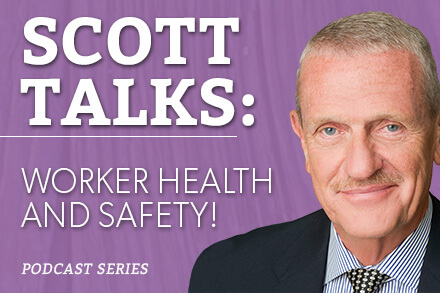Check out our latest podcast to learn how work plans can be used to prevent injuries.

Hi this is Scott Lawson, and today I want to talk about something that a lot of people get hung up on – the regulatory aspect of worker health and safety, and this is an issue where we find in the workers comp field where we’re pretty large in the state in New Hampshire that a significant number of the actual injuries that we see happening on the job have nothing to do with the regulatory environment and it’s people making poor decisions about how to do their job or poor decisions about how to work safely.
I always condense it down to a couple of things I call unsafe acts, and unsafe work practices that are predicated upon the fact that they’re doing a job that they don’t do all the time. And those fall into two categories. We call them routine tasks, and non-routine tasks. There’s a wide variety in what those two things mean – a routine task can be something that you do every day and it can be something that you do 400 times a day. And it is as repetitive as attaching a nut and a bolt together. It can also be something that you do once a week or once a month or once a quarter or once a year. But it’s something that you do every single time it needs to be done.
During a plant shutdown for example in the summertime, you can rebuild a boiler or you can pull a motor apart non-routine tasks are things that you have never done before and it’s something that you’re asked to do with a skill set that you have but it’s not necessarily a specific task that you’ve done before. And this is where the problem comes in. In both of those cases, if it’s a routine or a non-routine task in terms of skill set but it’s something that you haven’t done in a while or have never done before we always suggest that people sit down and develop a work plan before they even attempt to do those tasks that they’re not familiar with.
What we find is in a lot of cases that the routine task is something that’s only done once a month or once a quarter ends up being done the way they best remember it as opposed to having a specific work plan before they start. So, they don’t have the right tools for the job, they don’t have the right replacement parts to finish the job completely, they don’t have enough people to physically pick up, and move equipment and materials around, so you end up with one person trying to lift or move something that’s way too heavy for them. So, they don’t have that work plan in place they haven’t gone through and reviewed all the steps to the process. So therefore, they’re not adequately prepared to do it, and then that leads to somebody making a poor decision about how to do the job and end up getting hurt.
We have a very specific example lately of a tree cutter that we do some work with and they were in yard A actually taking down some trees in the neighbor in yard B came along and asked them if they could take down some trees for them. The work that they were doing in the yard was fairly small and not very elevated. And they did not have a crane on site which is typically the way that trees are taken down.
They decided to not wait and come back a different day and wait for the crane to come and help them take those trees down and decided to try to take the trees down using the limited equipment that they had which included a guy in a bucket or man lift that was halfway up the tree. Long story short, in an effort to get the job done and not have to wait and get their proper equipment the guy cut the tree down, it came backwards, landed on the lift, drove him into the ground, and it probably is going to result in a half-million-dollar worker’s comp claim. Severe head injuries, severe brain injuries, multiple surgeries are planned and all for the lack of actually sitting down and taking the time to come up with the proper work plan which ultimately is as simple as saying you do the job right and you do the job right the first time. As simple as all the tools that are required to be in place you walk through the process and decide exactly how you’re going to do it before you do it incompletely or do it inaccurately and end up with somebody getting hurt.
So in the future when you have to do anything that is not routine and rote and done every day and done to perfection, take the time to sit down and come up with a work plan and make sure that you have all the right pieces, and parts, tools, training etc., to be able to make sure that you could do the job properly and work safely.
We work with companies all the time to help them come up with work plans and devise systems in-house for determining what are routine and non-routine tasks. So, if you need help with this go to our website, www.thelawsongroup.com, or call us in New Hampshire at (603) 228-3610.





